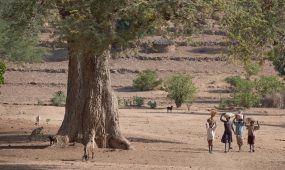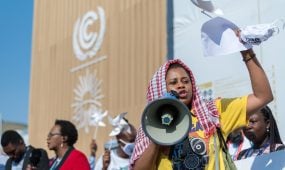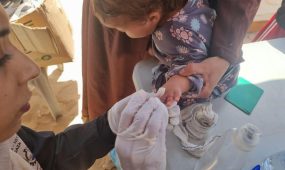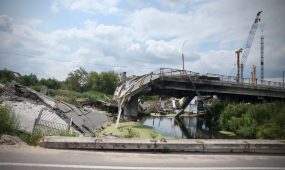Ecumenical solidarity: standing with Sudan in times of crisis
International
Since April 2023, Sudan has faced a harrowing humanitarian emergency due to clashes between the Sudan Armed Forces and the Rapid Support Forces (RSF). The consequences have been dire: millions displaced, basic necessities scarce, healthcare inaccessible, and education disrupted. Over 7.4 million people are displaced, making it the largest internal displacement crisis globally
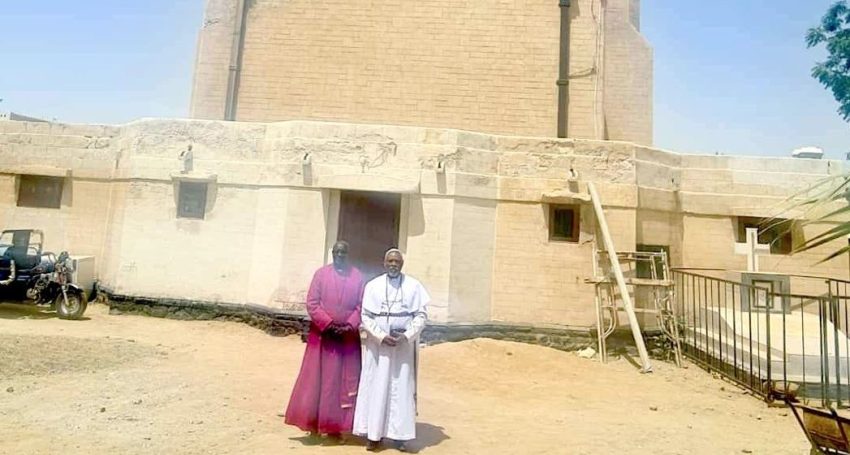
Sudan, in a cycle of conflict and suffering, found a glimmer of hope through an international joint ecumenical solidarity visit from 18-23 April.
The World Council of Churches (WCC), All Africa Conference of Churches, Fellowship of Christian Councils and Churches in the Great Lakes and Horn of Africa, ACT Alliance, and General Board of Global Ministries of the United Methodist Church united to support Sudan. This collaboration builds on previous efforts, including a solidarity visit in April 2022 and virtual ecumenical forums and prayer sessions.
One of the delegates, Jeannette Uwizeye, executive director, Fellowship of Christian Councils and Churches in the Great Lakes and Horn of Africa, shared that, in Sudan, “the cost of living is high. However, the pressing needs, especially after visiting internally displaced persons, are basic needs: food and shelter. In one of the camps, they brought out the fact that they have pregnant women and they have no health facilities. Sexual and gender-based violence are some other issues.”
The solidarity visit purpose went beyond immediate relief to fostering long-term peace-building in Sudan and the surrounding area. A key concept was accompaniment, which meant supporting Sudanese people in their healing and reconciliation journey. By engaging with church leaders, women, youth, and various faith groups, the delegation aimed to grasp the challenges and amplify the voices of those impacted by the crisis.
Elizabeth Kisiigha Zimba, ACT Alliance regional representative for Africa, shared that, at one of the camps, the camp leader, a kind-hearted man, couldn’t hold back his tears as he received the cash envelope. He was overwhelmed by the gesture, unable to believe such generosity. He remarked that the smiles on everyone’s faces, despite their dire circumstances, reflected a resilient hope for peace to reignite in Sudan and for life to regain its usual rhythm.
Advertisement
Rev. Dr Jin Yang Kim, who represented the General Board of Global Ministries of the United Methodist Church within the ecumenical delegation, said he understood the vital role of strengthening partnerships with local humanitarian groups. It became clear that international humanitarian channels often fail to adequately address the immediate needs of internally displaced persons.
Kim joined the delegation in visiting two shelters in Port Sudan: Red Sea School and Mayo Girls’ School. The internally displaced persons live in tents within these shelters, enduring scorching heat during the day and freezing cold at night. The Red Sea School has 85 houses, whereas the Mayo Girls School has 47. Internally displaced persons, primarily from Khartoum, lack basic necessities such as blankets, kitchen sets, and healthcare access.
Kim stated: “The key message to the Sudanese government is to ensure the accessibility of humanitarian aid. We are informed that another pressing challenge is that international humanitarian aid often arrives late. Instead of relying solely on humanitarian channels like UNHCR, WPF, and UNICEF, direct funds are needed to address urgent needs promptly.
“Churches and the national council of churches in conflict areas can serve as reliable and respected partners within local communities, fostering partnerships with local humanitarian organizations. Besides immediate response efforts, another vital lesson learned is the imperative of nurturing and harnessing local faith-based agencies for sustained long-term engagement,” said Kim.
Advertisement
The delegation’s participation in a Sunday worship service, led by Archbishop Ezekiel Kondo, underscored the transformative impact of solidarity. A survivor of Rwanda’s genocide highlighted the church’s role in rebuilding, evoking tears of hope from attendees.
“Those attending the service shed tears upon hearing her story, not tears of pain from the war, genocide, or loss of their homes, but tears of hope, envisioning their own capacity to forge new paths amidst present challenges and pain. This moment stands as a testament to solidarity with sisters and brothers in Sudan, one that I will carry forward as I journey to the most vulnerable places and people,” said Kim.
WCC president from Africa His Holiness Most Rev. Dr Rufus Okikiola Ositelu, of the Church of the Lord (Prayer Fellowship) Worldwide, also a member of the ecumenical delegation, said:
“As a result of our meetings with both the Christian and Muslim communities, it is very clear that the conflict in Sudan has nothing to do with religion, but politics, ethnicity, and power. The minister in charge of security informed us that extremists and fundamentalists exist, but are very few and that they have no role to play in Sudan, and that their actions are insignificant. The Sudan Christian Council is very grateful for the solidarity visit, particularly at this period when some Sudanese are fleeing the country because of the war; we decided to visit them. They are very grateful indeed. We were all invited to fellowship with them at the Anglican Church in Port-Sudan on 21 April, where I presented the homily. The theme of my message was: ‘At a time like this.’ ”
Ositelu concluded: “WCC should help to make life more meaningful and enjoyable in Africa through diplomatic channels. For instance, Africans travelling within Africa should be able to travel without any need for visa (i.e travel visa-free), just like the European Union. It saddens my heart to see the consequences of man-caused sufferings in some African countries due to bad decisions. We as the WCC should get involved more in prevention than cure. We should invest more time and resources to engage any situation that might lead to war. Doing this will require less time, energy and resources—prevention is better than cure. Last but not the least, we should continue to be our brothers’ and sisters’ keepers. God is love and He made us to care and be kind to others (Matthew 25:31-40).”
Since 15 April 2023, Sudan has faced a harrowing humanitarian emergency due to clashes between the Sudan Armed Forces and the Rapid Support Forces (RSF). The consequences have been dire: millions displaced, basic necessities scarce, healthcare inaccessible, and education disrupted. Over 7.4 million people are displaced, making it the largest internal displacement crisis globally.
WCC urges prayers—and action—for the plight of people in Sudan (WCC Interview, 25 April 2024)
WCC meets president of Sudan for discussion of roadmap to peace (WCC News release, 26 April 2024)
Photo gallery from the visit to Sudan
First published on the World Council of Churches website on 2 May 2024.

